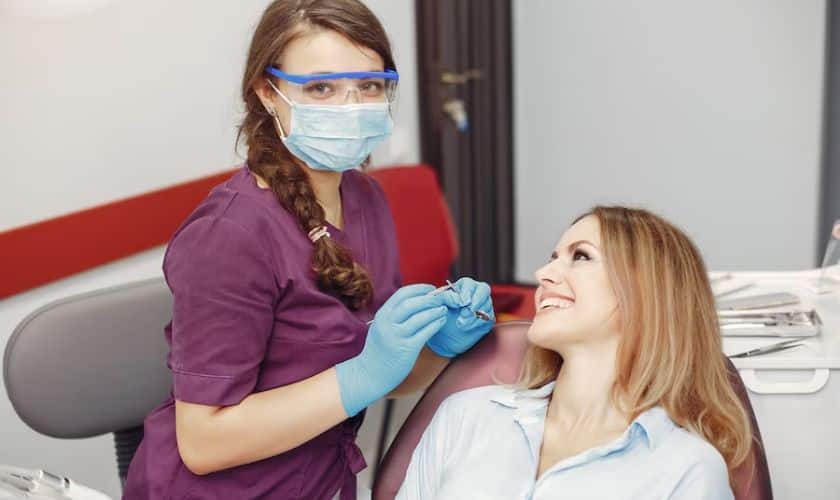Call: (810) 674-3060
How to Recognize a Dental Emergency: Signs and Symptoms to Look For

Have you ever experienced sudden dental pain, swelling, or bleeding and wondered if it’s a dental emergency? A dental emergency can be a scary experience that requires immediate attention. Knowing how to recognize the signs and symptoms of a dental emergency can help you respond quickly and effectively. In this blog post, we will guide you through everything you need to know about dental emergencies – from what they are, common types of emergencies, how to react in an emergency situation, and when to seek professional help. Keep reading to learn more!
What is a Dental Emergency?
A dental emergency is an unexpected and urgent dental problem that requires immediate attention from a professional dentist. It can be caused by a variety of factors, such as injury to the teeth or gums, severe pain or sensitivity in the teeth, bleeding from the mouth, loose or knocked-out teeth, swelling in the face or jaw area, and more.
One common type of dental emergency is a toothache. This can be caused by many factors such as cavities, gum disease, or injury to your teeth. If you are experiencing intense pain in your teeth which cannot be relieved with over-the-counter painkillers then you should seek medical help immediately.
Another example of a dental emergency is when one experiences trauma to the face leading to broken braces and wires protruding into cheeks & gums resulting in significant discomfort requiring immediate attention from an orthodontist.
It’s important to understand that not all oral problems require emergency treatment. If you’re unsure whether your condition qualifies as an emergency situation it’s always best to contact your dentist for advice on how best to handle this issue before scheduling an appointment with them
Common Dental Emergencies
Dental emergencies can happen at any time, and it’s important to know how to recognize them. Here are some of the most common dental emergencies:
Toothaches: Toothaches can be caused by a variety of things, including cavities, gum disease, or an abscessed tooth.
Broken or chipped teeth: This can cause severe pain and may require immediate attention from a dentist.
Knocked-out teeth: If you have knocked out a tooth due to injury or accident, it is crucial that you see your dentist as soon as possible.
Loose teeth: A loose tooth could indicate an infection or underlying issue that needs immediate treatment.
Lost fillings or crowns: When fillings or crowns fall out, it leaves your teeth exposed to bacteria which can lead to further damage if not treated in time.
It is essential to take action immediately when facing any of these dental emergencies. Don’t hesitate! Get in touch with your dentist right away for proper care and treatment.
How to Respond to a Dental Emergency
If you find yourself facing a dental emergency, it’s important to stay calm and take the appropriate steps to handle the situation. Here are some tips on how to respond to a dental emergency:
First, assess the severity of the situation. If you’re experiencing severe pain or bleeding, this is likely an urgent issue that requires immediate attention from a dentist. If your tooth has been knocked out or broken, try to locate any missing pieces and keep them in a safe place.
If you’re dealing with pain or swelling, use an ice pack or cold compress on the affected area for 10-15 minutes at a time. This can help reduce inflammation and provide temporary relief until you can see a dentist.
Avoid taking aspirin or other pain relievers directly on the affected area as this could further irritate it. Instead, take over-the-counter pain medication like ibuprofen if necessary.
In some cases, it may be possible to temporarily reattach a dislodged tooth by gently pushing it back into its socket and biting down on gauze until you can get professional help.
Remember that every dental emergency is different and may require specific treatment methods. The most important thing is to seek professional help as soon as possible so that your condition doesn’t worsen over time.
When to Seek Professional Help
When it comes to dental emergencies, knowing when to seek professional help is crucial. While some issues can be managed at home with temporary solutions until you’re able to see your dentist, others require immediate attention from a dental professional.
If you experience severe pain that doesn’t subside even after taking over-the-counter pain medication, this could indicate a serious issue such as an abscess or infection, and should not be ignored. It’s important to seek professional help as soon as possible in these cases.
Broken or chipped teeth are also considered dental emergencies. Even if the damage seems minor, it’s essential to have it checked out by a dentist promptly. Cracks or breaks in the tooth enamel can result in sensitivity and further damage without proper treatment.
If you lose a permanent tooth due to injury or accident, seeking emergency dental care within 30 minutes of the incident greatly increases your chances of saving the tooth. Be sure to handle the dislodged tooth carefully by holding it by its crown and avoid touching its roots.
In general, any sudden changes in your oral health that cause discomfort or concern should prompt you to call your dentist for advice on whether an appointment is necessary. Remember that timely intervention often makes all the difference when it comes to preserving both your smile and overall oral health!
Conclusion
Knowing how to recognize a dental emergency can mean the difference between saving or losing your tooth. By understanding what constitutes a dental emergency and being familiar with the signs and symptoms, you can take quick action when needed.
Remember, if you experience any sudden pain or trauma to your teeth or gums that cannot be managed by over-the-counter pain relievers, seek professional help immediately. Dental emergencies should never be ignored as they can escalate quickly and lead to serious complications.
By following these guidelines for recognizing and responding to dental emergencies, you can ensure the health of your teeth and gums in any situation. Stay prepared and stay safe!




